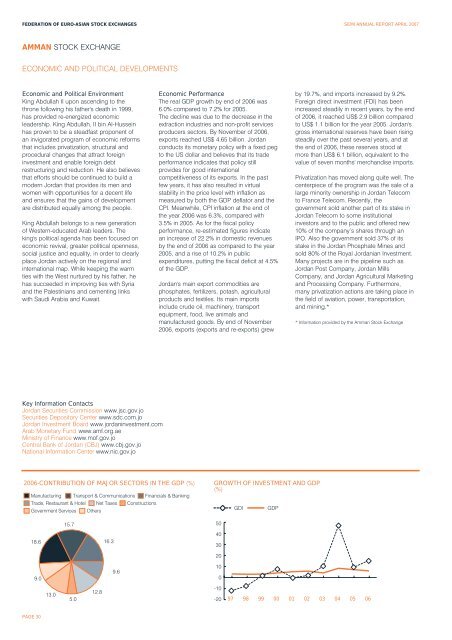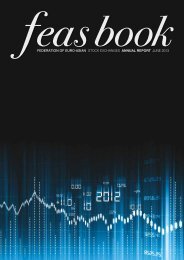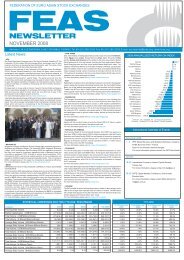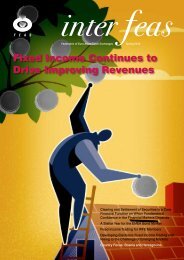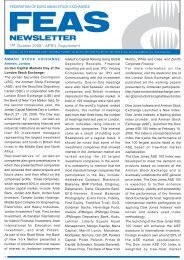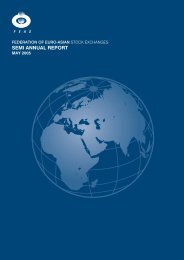Download - FEAS
Download - FEAS
Download - FEAS
Create successful ePaper yourself
Turn your PDF publications into a flip-book with our unique Google optimized e-Paper software.
FEDERATION OF EURO-ASIAN STOCK EXCHANGES SEMI ANNUAL REPORT APRIL 2007<br />
AMMAN STOCK EXCHANGE<br />
ECONOMIC AND POLITICAL DEVELOPMENTS<br />
Economic and Political Environment<br />
King Abdullah II upon ascending to the<br />
throne following his father's death in 1999,<br />
has provided re-energized economic<br />
leadership. King Abdullah, II bin Al-Hussein<br />
has proven to be a steadfast proponent of<br />
an invigorated program of economic reforms<br />
that includes privatization, structural and<br />
procedural changes that attract foreign<br />
investment and enable foreign debt<br />
restructuring and reduction. He also believes<br />
that efforts should be continued to build a<br />
modern Jordan that provides its men and<br />
women with opportunities for a decent life<br />
and ensures that the gains of development<br />
are distributed equally among the people.<br />
King Abdullah belongs to a new generation<br />
of Western-educated Arab leaders. The<br />
king's political agenda has been focused on<br />
economic revival, greater political openness,<br />
social justice and equality, in order to clearly<br />
place Jordan actively on the regional and<br />
international map. While keeping the warm<br />
ties with the West nurtured by his father, he<br />
has succeeded in improving ties with Syria<br />
and the Palestinians and cementing links<br />
with Saudi Arabia and Kuwait.<br />
Economic Performance<br />
The real GDP growth by end of 2006 was<br />
6.0% compared to 7.2% for 2005.<br />
The decline was due to the decrease in the<br />
extraction industries and non-profit services<br />
producers sectors. By November of 2006,<br />
exports reached US$ 4.65 billion. Jordan<br />
conducts its monetary policy with a fixed peg<br />
to the US dollar and believes that its trade<br />
performance indicates that policy still<br />
provides for good international<br />
competitiveness of its exports. In the past<br />
few years, it has also resulted in virtual<br />
stability in the price level with inflation as<br />
measured by both the GDP deflator and the<br />
CPI. Meanwhile, CPI inflation at the end of<br />
the year 2006 was 6.3%, compared with<br />
3.5% in 2005. As for the fiscal policy<br />
performance, re-estimated figures indicate<br />
an increase of 22.2% in domestic revenues<br />
by the end of 2006 as compared to the year<br />
2005, and a rise of 10.2% in public<br />
expenditures, putting the fiscal deficit at 4.5%<br />
of the GDP.<br />
Jordan's main export commodities are<br />
phosphates, fertilizers, potash, agricultural<br />
products and textiles. Its main imports<br />
include crude oil, machinery, transport<br />
equipment, food, live animals and<br />
manufactured goods. By end of November<br />
2006, exports (exports and re-exports) grew<br />
by 19.7%, and imports increased by 9.2%.<br />
Foreign direct investment (FDI) has been<br />
increased steadily in recent years, by the end<br />
of 2006, it reached US$ 2.9 billion compared<br />
to US$ 1.1 billion for the year 2005. Jordan's<br />
gross international reserves have been rising<br />
steadily over the past several years, and at<br />
the end of 2006, these reserves stood at<br />
more than US$ 6.1 billion, equivalent to the<br />
value of seven months' merchandise imports.<br />
Privatization has moved along quite well. The<br />
centerpiece of the program was the sale of a<br />
large minority ownership in Jordan Telecom<br />
to France Telecom. Recently, the<br />
government sold another part of its stake in<br />
Jordan Telecom to some institutional<br />
investors and to the public and offered new<br />
10% of the company’s shares through an<br />
IPO. Also the government sold 37% of its<br />
stake in the Jordan Phosphate Mines and<br />
sold 80% of the Royal Jordanian Investment.<br />
Many projects are in the pipeline such as<br />
Jordan Post Company, Jordan Mills<br />
Company, and Jordan Agricultural Marketing<br />
and Processing Company. Furthermore,<br />
many privatization actions are taking place in<br />
the field of aviation, power, transportation,<br />
and mining.*<br />
* Information provided by the Amman Stock Exchange<br />
Key Information Contacts<br />
Jordan Securities Commission www.jsc.gov.jo<br />
Securities Depository Center www.sdc.com.jo<br />
Jordan Investment Board www.jordaninvestment.com<br />
Arab Monetary Fund www.amf.org.ae<br />
Ministry of Finance www.mof.gov.jo<br />
Central Bank of Jordan (CBJ) www.cbj.gov.jo<br />
National Information Center www.nic.gov.jo<br />
2006-CONTRIBUTION OF MAJOR SECTORS IN THE GDP (%)<br />
Manufacturing Transport & Communications Financials & Banking<br />
Trade, Restaurant & Hotel Net Taxes Constructions<br />
Government Services Others<br />
15.7<br />
18.6 16.3<br />
GROWTH OF INVESTMENT AND GDP<br />
(%)<br />
50<br />
40<br />
30<br />
GDI<br />
GDP<br />
9.0<br />
9.6<br />
20<br />
10<br />
0<br />
13.0<br />
5.0<br />
12.8<br />
-10<br />
-20<br />
97 98 99 00 01 02 03 04 05 06<br />
PAGE 30


